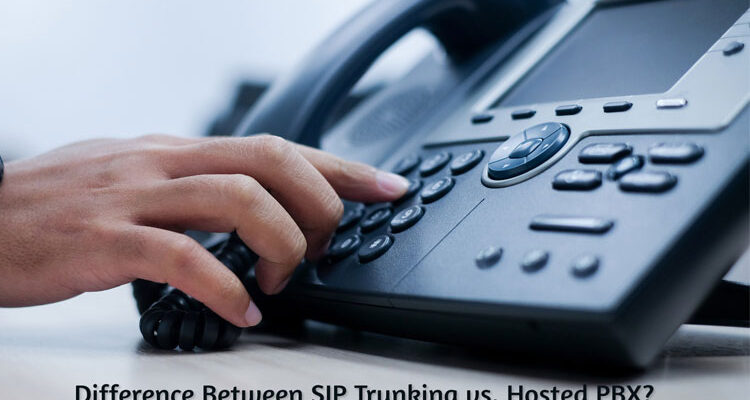Hosted PBX and SIP Trunking for PBX On-Premise is a provider that is probably considered by a commercial nterprise to enforce a cellphone system. There are VoIP answers with similar functions. However, they may be exceptional in phrases of logistics, technical, and financial.
Facilitated PBX and SIP Trunking for PBX On-Premise is help that may be viewed as a business to actualize a phone framework. The two are VoIP arrangements with comparative capacities. However, they are distinctive as far as coordination, specialization, and financial. Numerous business presiding officers who would like to lower costs on business correspondence could be trying to see every accessible alternative. Without a specialized foundation in VoIP, it is hard to comprehend things like trunking SIP and PBX and the general star and cons of every accessible choice.
Indeed, the correct business correspondence framework isn’t an alternative between trunking PBX and SIP facilitated. They are various terms as PBX administrations enabled utilizing SIP to interface with VoIP endpoints (for example, VoIP telephones or cell applications), and PBX where clients can use SIP poles (rather than costly administrations). In this blog post, we will define the trunking PBX and SIP is hosted, so you can see how they might match your VoIP decision.
What is a Hosted PBX System?
The Hosted Private VoIP telephone system (PBX) has a server located at the location of third-party providers.
Because of its remote location, you don’t need to buy or operate a physical PBX box. Everything works in the Cloud. When you do a call or get a call, it goes to the service provider before it reaches you.
What is SIP Trunking?
SIp trunking means the VoIP phone system that uses your already existing PBX phone system to connect with the internet connection. This technique enables the team members to make the call without much on-premises equipment.
With SIP Trunking, you change traditional telephone lines using VoIP to send your voice as data on the internet.
The protocol then further combines the data with other streaming services such as video conferencing and sharing screens.
SIp trunking installed at your office internet and therefore you don’t need a physical phone line.
Difference Between Hosted PBX and SIP Trunking
The main differences between PBX services and on-premises are hosted.
Cost
Your office will require an IP phone, switches, and business class Broadband administrations to set the facilitated PBX. The supplier “obliges” the genuine PBX worker and look after them, so you needn’t bother with extra equipment. Starting here of view, the administration that is facilitated sets aside your cash for preliminary startup charges.
Reason PBX and SIP Trunking, then again, requires huge forthright capital costs. IT staff should introduce the IP PBX worker set up and interface with the SIP trunking administration. Likewise, it is regularly suggested that the business introduce a separate web network for trunking taste administrations.
Scalability
SIP Trunking Phone Systems can increase, to a certain extent, but they require you to buy more on-premise servers when you expand significantly (and configure the appropriate call plan). One PBX can generally deal with up to a few hundred cellphones.
VoIP administrations are posted; then again, they have practically limitless space for your clients. The facilitating VoIP phone framework permits you to add cellphones and new clients to your telephone framework in a couple of straightforward advances. It usually is comfortable with the goal that non-it experts can deal with it. With IP telephone boot, the entire cycle to add a telephone to your organization should be possible in your internet browser.
Maintenance
Any infrastructure maintenance costs directly contribute to what the company will eventually be selected to invest.
With sip trunking services, you must hire IT staff to maintain the system. Because the server lies in your place, you will be responsible for their maintenance.
If there is a software update for your PBX available, your team must handle assignments—network manager; you need to install the software again and reset the server for updates to get into force.
PBX services remotely, with their definition, meaning you don’t have to deal with any physical infrastructure.
Your provider handles software maintenance and server. Their dedicated staff will include an increase or blackout that appears.
You need to take care of the internal works, such as adding users, changing these features and tasks according to your needs.
Flexibility
For sip trunking services your function, all cellphones must be on the same network. That means that the SIP trunking users can access the benefits if they are present in the same network area.
Whereas the remote PBX phone systems are hosted in the cloud system, it is used from any location and various devices. Examples include at home or even while traveling.
Calling Features
Hosted PBX companies compete with each other to develop leading business call features. The opposition urges this VoIP supplier to deliver new outsider coordination, ongoing correspondence add-on, uncommon calling community announcing, moment video conferencing, and
PBX on the reason will, in general, miss these new highlights except if you have a committed computer programmer who can construct and keep a remarkable phone application.
Security
If your web network experiences jitter, delay, loss of bundles, or low data transfer capacity, this will diminish your call. You can test your organization’s quality with VoIP network tests. Likewise, if your organization isn’t protected, you uncover your telephone framework to potential security infringement.
On the off chance that the trunking taste administration, you decide to run an uncommon association for you (not through the open web), this is reasonable for better availability and security. In any case, most trunking SIP and PBX administrations are facilitated by sending bundles using the public web as of now.
Conclusion
VoIP telephone services such as Hosted PBX and SIP Trunking have provided flexibility to businesses in their communication.
Companies can now stream videos and share screens by just making necessary voice calls, among other things. Such adaptability will only attract more businesses to this service.
There are features that you should consider when choosing a business telephone system for your organization. Security, flexibility, scalability, and sustainable cost and maintenance are some of the main differences between choosing a VoIP solution hosted and trunking sip services. In the end, you should consult with your network administrator or IT staff to discuss the best options for you.




